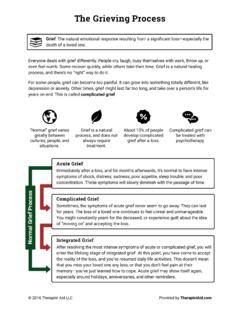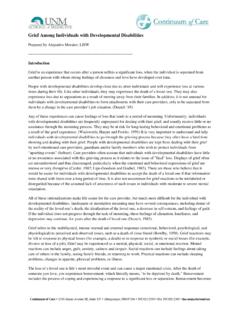Transcription of COPING WITH GRIEF AND LOSS - University of North …
1 COPING with GRIEF AND loss Far from being a sign of weakness, grieving is a healthy and naturally healing process. While certain emotional responses are common, each person s GRIEF is also individual, and may be experienced differently. GRIEF , with its many ups and downs, may last longer than most people expect or realize. The best way to deal with a loss is to recognize it, face and accept your feelings and reactions, and get support during the grieving process. Common GRIEF Reactions Denial, shock, numbness, confusion Fear, despair, helplessness, relief Anger and guilt (which may be misdirected) Sadness, loneliness, tearfulness, depression, regret Diminished feelings of safety; increased feelings of vulnerability Disturbances in normal patterns of sleeping and eating Fatigue, apathy, social withdrawal Feelings of physical pain ( , chest pain) Feelings of unfinished business or survivor s guilt NOT having a strong emotional reaction Both positive and GRIEF -related memories and feelings Beginning of re-engagement with life Continuing adjustment to life changes Gradual lessening of feelings of GRIEF and acceptance of the reality of one s loss Tips for COPING with GRIEF Take your time and limit shoulds.
2 Don t judge your reactions. Talk. Share your feelings and the meaning this loss has for you. Pay attention to what your body needs. Exercise, adequate rest & sleep, and balanced nutrition are essential. Participate in meaningful rituals and ceremonies. Surround yourself with friends and family who love and support you. Don t isolate yourself. Be patient with yourself. Tears may come unexpectedly, even when you thought you were finished grieving. Consistently take time to grieve, as well as giving yourself breaks from the grieving process. Strive to find a balanced way of dealing with the demands of daily life. Whenever possible, put off major decisions ( , changing jobs, partners, or residences). Pray, meditate, reflect, and connect with your religious and spiritual convictions and community. Be sensitive to and flexible with your new needs and changes in lifestyle. Understanding GRIEF GRIEF is the normal human response to loss . (It s healing; you aren t losing your mind.)
3 GRIEF must be expressed. (Accept and let your feelings out.) GRIEF needs to be shared. (Yes, you need other people.) Each of us grieves in our own way. (Chances are you ll do it differently than others.) Each of us grieves in our own time. (Be patient with yourself.) GRIEF affects the five major dimensions of life: physical, emotional, mental, social, and spiritual. In GRIEF , we move from surviving, to healing, to growing. Growing Through GRIEF Physically exercise regularly, drink plenty of water, get plenty of rest, breathe deeply, use relaxation skills, cut back on commitments, limit sugar, alcohol, nicotine, and caffeine use Mentally read inspirational books, make lists (be kind to your memory!), be gentle with self-criticisms, experience beauty, learn about the GRIEF process, (to the extent possible) alternate engagement with and taking breaks from your GRIEF . Emotionally find a confidant (or two) you can trust, let yourself be sad and cry, express your feelings through art or music, tell your story (repeatedly), find respites (times away) from your pain.
4 Socially - reach out to friends and family, accept help (even ask for it!), be flexible and leave yourself alternatives when attending social events, join a support group, help others, say yes to invitations (even when you don t feel like it) but also feel free to sometimes say no, risk caring again. Spiritually - reassess your values and priorities, pray, meditate, and take time alone, experience the beauty of nature, connect with your church/spiritual community Helping Others with GRIEF Be available. (Call, send a card, stop by to talk, share a meal or activity.) Communicate. (Initiate conversation, listen, be willing to talk about the loss .) Allow expression of feelings. (Listening is more powerful than advice-giving.) Avoid making judgments. (Understand and accept differences in grieving and COPING .) Be patient. (Expect ups and downs, but not a convenient time schedule). Be sensitive. (Remember times and events that may be especially hard for the grieving person.)
5 Encourage physical, emotional, and social self-care. (Also encourage openness to the support of others and professional help, if appropriate.) Accept your own limitations. (Your support is important, but you cannot take away another s pain.)


















